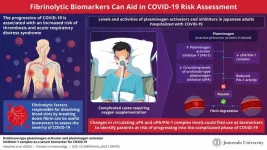(Press-News.org) One in four older adults take aspirin at least three times a week, mostly in hopes of preventing heart attacks and strokes, a new poll shows.
But many people aged 50 to 80 who said they take aspirin may not need to, the findings from the University of Michigan National Poll on Healthy Aging suggest.
In all, 57% of people aged 50 to 80 who say they take aspirin regularly also said they don’t have a history of cardiovascular disease. Such people should have a conversation with their health care provider about what’s best for them before stopping or starting aspirin use.
National guidelines have changed in recent years for using aspirin for prevention, because of new knowledge about who actually gets the most benefit from its ability to reduce the risk of blood clots, and who faces a risk of bleeding.
Now, guidelines mostly focus on aspirin use in those who already have cardiovascular disease – including those who have survived a heart attack or stroke – and those who face a high risk of it because of their personal health and family history.
The poll shows 14% of all adults age 50 to 80 are taking aspirin even though they have no history of cardiovascular issues.
Whether or not someone has a cardiovascular history, aspirin does pose a bleeding risk that increases with age. That has led to guidelines that advise against routine aspirin use after age 70, or suggest that it may be reasonable to consider stopping around age 75, in those without cardiovascular disease.
The poll finds 42% of all adults age 75 to 80 are taking aspirin. Meanwhile, 31% of all older adults age 50 to 80 who take aspirin don’t appear to know about the bleeding risk associated with it.
The poll is based at the U-M Institute for Healthcare Policy and Innovation and supported by AARP and Michigan Medicine, U-M’s academic medical center. The poll team asked a national sample of adults aged 50 to 80 about their health history and use of aspirin; those who take it were also asked about why.
“Aspirin is no longer a one-size-fits-all preventive tool for older adults, which for decades it was touted as,” says Jordan Schaefer, M.D., M.Sc., a hematologist at Michigan Medicine who worked with the poll team. “This poll shows we have a long way to go to make sure aspirin use is consistent with current knowledge.”
Adds Geoffrey Barnes, M.D., M.Sc., a Michigan Medicine cardiologist who also worked on the poll, “As guidelines change, it’s important for everyone over 40 to talk with their health care provider about their individual cardiovascular risk based on their family history, past health issues, current medications, recent test results like blood pressure, cholesterol and blood sugar, and lifestyle factors like smoking, physical activity and eating habits. Preventive aspirin use should be based on age plus these factors.”
Updated knowledge and guidance
In all, the poll finds 71% of older adults who take aspirin started four or more years ago, which could mean that they and their health care provider may be basing their use on old advice.
Schaefer and Barnes note that because of continuing research on aspirin, two major guidelines changed in recent years for older adults who don’t have a history of cardiovascular disease. In such people, taking aspirin is called primary prevention.
The American College of Cardiology and American Heart Association together say that daily low dose aspirin use might be considered for the prevention of cardiovascular disease for select adults 40 to 70 of age who are at increased risk of cardiovascular disease, but not bleeding, based on a guideline updated in 2019. The U.S. Preventive Services Task Force, which advises the federal government updated its guideline in 2022, and recommends against initiating aspirin for the prevention of cardiovascular disease in adults 60 years or older.
The AHA and ACC offer online calculators to help clinicians estimate a person’s 10-year risk of cardiovascular disease if they don’t already have it. Adults age 40-70 at higher cardiovascular disease risk may be good candidates for aspirin as primary prevention but should always talk with a health care provider before starting to take it.
Meanwhile, for people who have already had a heart attack, some types of stroke or other cardiovascular diagnoses, the use of aspirin is still generally recommended unless the person is unable to tolerate it or has an unacceptable bleeding risk. This is called secondary prevention and should be done only under the supervision of a health care provider.
More dialogue needed
The poll shows the importance of open communication between health care providers and their older patients about all types of medication and supplements, including those like aspirin that are available ‘over the counter’ without a prescription.
The poll finds that 96% of those who take aspirin and have a cardiovascular history said their health care provider had recommended it. But 77% of those who take aspirin and have no cardiovascular history said the same – suggesting a need for a discussion about updated guidelines. Also among those who take aspirin but have no cardiovascular disease history, 20% said they started doing it on their own and 5% said friends and family had advised them.
“Thanks to updated knowledge, and reductions in other major risk factors such as smoking, we can use aspirin more precisely, focusing on those who need this inexpensive and easy-to-obtain preventive medication most and avoiding unnecessary risks for others,” said poll director Jeffrey Kullgren, M.D., M.P.H., M.S. “These poll findings should spur more conversations between health care providers and patients about what’s right for them.” Kullgren is a primary care physician at the VA Ann Arbor Healthcare System and associate professor of internal medicine at U-M.
The poll report is based on findings from a nationally representative survey conducted by NORC at the University of Chicago for IHPI and administered online and via phone in July and August 2023 among 2,657 adults aged 50 to 80, with an oversample of non-Hispanic Black and Hispanic populations. The sample was subsequently weighted to reflect the U.S. population. Read past National Poll on Healthy Aging reports and about the poll methodology.
END
An aspirin a day? Poll of older adults suggests some who take it may be following outdated advice
More than half of people age 50 to 80 taking aspirin don’t have cardiovascular disease, for some this means low preventive benefit and bleeding risks
2024-03-07
ELSE PRESS RELEASES FROM THIS DATE:
What makes a pathogen antibiotic-resistant?
2024-03-07
Antimicrobial resistance is a story of constantly moving parts and players. With every new or tweaked antibiotic or antimicrobial drug, the targeted pathogens begin the evolutionary dance of acquiring resistance, prompting researchers to constantly develop workarounds or entirely new classes of medicine.
Understanding the underlying mechanisms of acquired antimicrobial resistance is critical to the fight, a case of knowing one’s enemy. In a new paper published March 2, 2024 in npj Antimicrobials and Resistance, part of the Nature Portfolio, researchers at Sanford Burnham Prebys, working with Roche Pharma Research and Early Development, ...
Method rapidly verifies that a robot will avoid collisions
2024-03-07
Before a robot can grab dishes off a shelf to set the table, it must ensure its gripper and arm won’t crash into anything and potentially shatter the fine china. As part of its motion planning process, a robot typically runs “safety check” algorithms that verify its trajectory is collision-free.
However, sometimes these algorithms generate false positives, claiming a trajectory is safe when the robot would actually collide with something. Other methods that can avoid false positives are typically too slow for robots in the real world.
Now, MIT researchers have developed a safety check technique which can prove with 100 percent accuracy ...
Eating habits, physical activity practice and clinical prognosis of colorectal cancer patients with overweight/obesity
2024-03-07
Background and objectives
Obesity is a chronic metabolic disease associated with the development of several other diseases, including cancer. The present study aims to evaluate the eating habits, physical activity, and clinical profiles of colorectal cancer (CRC) patients with overweight/obesity.
Methods
A cross-sectional study was conducted with data collected from the medical records of patients diagnosed with CRC (n = 41) from June 2019 to June 2022. Additionally, a questionnaire (n = 35) was applied to gather information on eating habits and physical activity. The data were ...
Exploring the effectiveness of a novel pain management device for endometriosis pain
2024-03-07
Endometriosis is a chronic condition affecting women, often resulting in painful symptoms such as menstrual cramps and pelvic pain. Pain caused by endometriosis significantly lowers the quality of life and reproductive health of affected women, with around one-third of women still experiencing pain and discomfort despite treatment. While hormonal therapies and surgeries are common treatments, they often do not result in complete alleviation of symptoms. Effectively managing pain is, therefore, crucial for managing ...
Fibrinolytic biomarkers for identifying patients at risk of severe COVID-19
2024-03-07
The global impact of the COVID-19 pandemic on healthcare systems has been significant. The sudden surge in infected cases overwhelmed hospitals and disrupted routine healthcare services, thus further worsening public health. Managing patients, too, has been challenging due to the variation of COVID-19 symptoms, ranging from mild to severe, that require medical intervention.
To help hospitals prioritize patients in need of care, researchers have been looking into various biological markers that can determine the risk of the disease becoming more severe. Among these, proteins in the blood related to blood clot formation, increased inflammation, and ...
Exploring the surface properties of NiO with low-energy electron diffraction
2024-03-07
Spintronics is a field that deals with electronics that exploit the intrinsic spin of electrons and their associated magnetic moment for applications such as quantum computing and memory storage devices. Owing to its spin and magnetism exhibited in its insulator-metal phase transition, the strongly correlated electron systems of nickel oxide (NiO) have been thoroughly explored for over eight decades. Interest in its unique antiferromagnetic (AF) and spin properties has seen a revival lately, since NiO is a potential material for ultrafast spintronics devices.
Despite this rise in popularity, exploration of its surface magnetic properties using ...
What drives students to take up teaching? New study explores aspirations and challenges faced by prospective teachers in Japan
2024-03-07
As role models and mentors for the youth, teachers play an important role in guiding children into well-rounded adults. However, excessive workloads and high skill expectations have allegedly led to teacher shortages in Japan. In 2022, the Ministry of Education Culture, Sports, Science, and Technology (MEXT) reported a record low in applicants for primary school teaching positions, and a survey from the same year revealed that 65.8% of 924 full-time educators expressed a desire to quit due to overwhelming demands.
To address the teacher shortage, Associate Professor Akihiro Saito from ...
Baby quasars: Growing supermassive black holes
2024-03-07
The James Webb Space Telescope makes one of the most unexpected findings within its first year of service: A high number of faint little red dots in the distant Universe could change the way we understand the genesis of supermassive black holes. The research, led by Jorryt Matthee, Assistant Professor in astrophysics at the Institute of Science and Technology Austria (ISTA), is now published in The Astrophysical Journal.
A bunch of little red dots found in a tiny region of our night sky might be an unexpected breakthrough for the James Webb Space Telescope (JWST) within its first year of service. These objects were indistinguishable from normal galaxies through the ...
Carnegie Mellon researchers develop new machine learning method for modeling of chemical reactions
2024-03-07
Researchers from Carnegie Mellon University and Los Alamos National Laboratory have used machine learning to create a model that can simulate reactive processes in a diverse set of organic materials and conditions.
"It's a tool that can be used to investigate more reactions in this field," said Shuhao Zhang, a graduate student in Carnegie Mellon University's Department of Chemistry. "We can offer a full simulation of the reaction mechanisms."
Zhang is the first author on the paper that explains the creation and results of this new machine learning model, ...
Embargoed: For childhood cancer survivors, inherited genetic factors influence risk of cancers later in life
2024-03-07
Common inherited genetic factors that predict cancer risk in the general population may also predict elevated risk of new cancers among childhood cancer survivors, according to a study led by researchers at the National Cancer Institute (NCI), part of the National Institutes of Health. The findings, published March 7, 2024, in Nature Medicine, provide additional evidence that genetics may play an important role in the development of subsequent cancers in survivors of childhood cancer and suggest that common inherited variants could potentially inform screening and long-term ...
LAST 30 PRESS RELEASES:
Medicare patients get different stroke care depending on plan, analysis reveals
Polyploidy-induced senescence may drive aging, tissue repair, and cancer risk
Study shows that treating patients with lifestyle medicine may help reduce clinician burnout
Experimental and numerical framework for acoustic streaming prediction in mid-air phased arrays
Ancestral motif enables broad DNA binding by NIN, a master regulator of rhizobial symbiosis
Macrophage immune cells need constant reminders to retain memories of prior infections
Ultra-endurance running may accelerate aging and breakdown of red blood cells
Ancient mind-body practice proven to lower blood pressure in clinical trial
SwRI to create advanced Product Lifecycle Management system for the Air Force
Natural selection operates on multiple levels, comprehensive review of scientific studies shows
Developing a national research program on liquid metals for fusion
AI-powered ECG could help guide lifelong heart monitoring for patients with repaired tetralogy of fallot
Global shark bites return to average in 2025, with a smaller proportion in the United States
Millions are unaware of heart risks that don’t start in the heart
What freezing plants in blocks of ice can tell us about the future of Svalbard’s plant communities
A new vascularized tissueoid-on-a-chip model for liver regeneration and transplant rejection
Augmented reality menus may help restaurants attract more customers, improve brand perceptions
Power grids to epidemics: study shows small patterns trigger systemic failures
Computational insights into the interactions of andrographolide derivative SRJ09 with histone deacetylase for the management of beta thalassemia
A genetic brake that forms our muscles
CHEST announces first class of certified critical care advanced practice providers awarded CCAPP Designation
Jeonbuk National University researchers develop an innovative prussian-blue based electrode for effective and efficient cesium removal
Self-organization of cell-sized chiral rotating actin rings driven by a chiral myosin
Report: US history polarizes generations, but has potential to unite
Tiny bubbles, big breakthrough: Cracking cancer’s “fortress”
A biological material that becomes stronger when wet could replace plastics
Glacial feast: Seals caught closer to glaciers had fuller stomachs
Get the picture? High-tech, low-cost lens focuses on global consumer markets
Antimicrobial resistance in foodborne bacteria remains a public health concern in Europe
Safer batteries for storing energy at massive scale
[Press-News.org] An aspirin a day? Poll of older adults suggests some who take it may be following outdated adviceMore than half of people age 50 to 80 taking aspirin don’t have cardiovascular disease, for some this means low preventive benefit and bleeding risks






